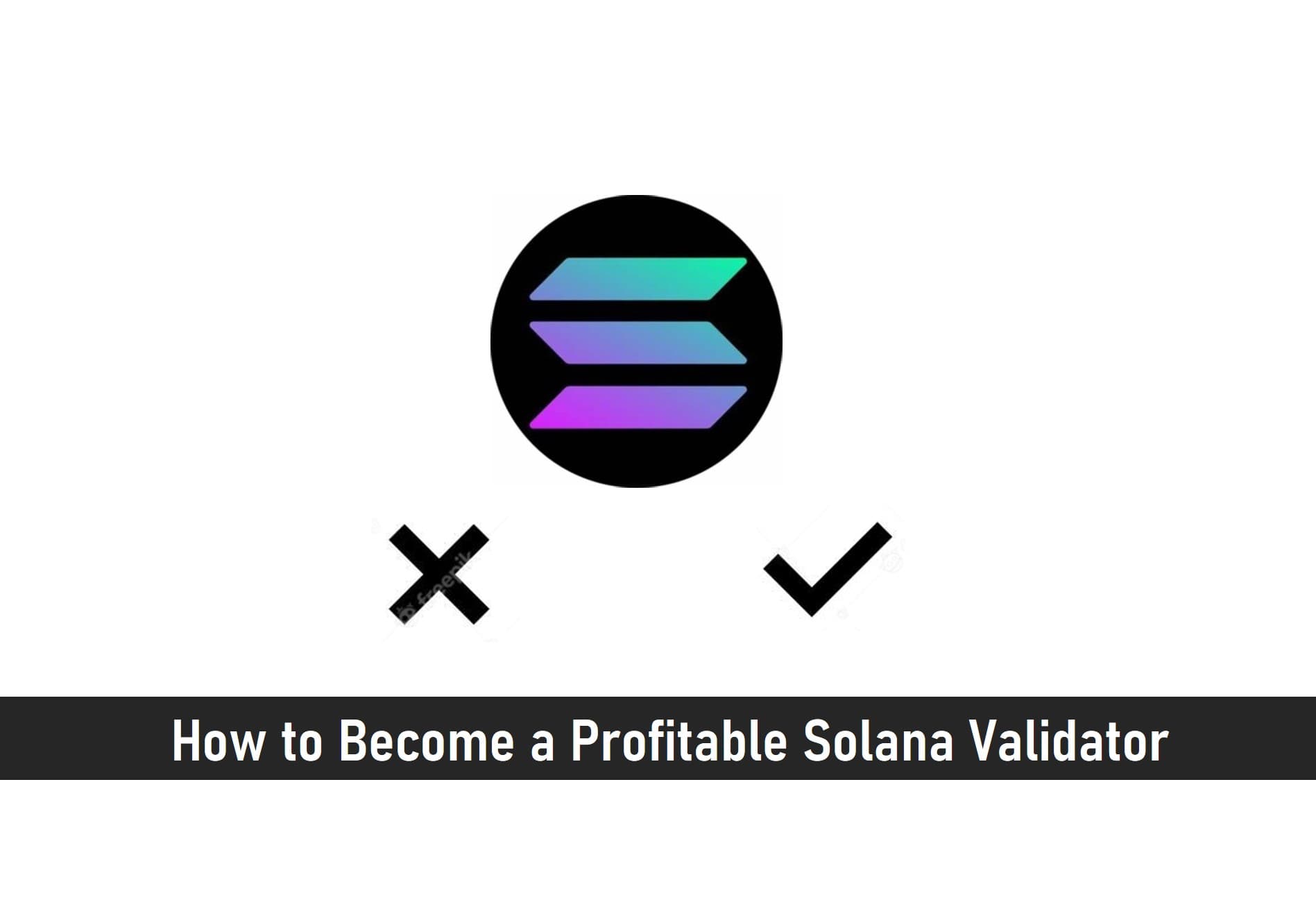
Who is a Solana Validator?
Firstly, a validator is a person that verifies all transactions into the blockchain, once they are verified and secured, the transactions are added to the distributed ledger or records.
Solana Validators form the backbone of Solana’s network by verifying all Solana (SOL) transactions, participating in a consensus, and securing the censor-resistant and high-performing blockchain there is.
Becoming a profitable Solana validator could be a very profitable venture depending on the amount of SOL you stake.

Key Takeaways
• Delegating a stake is a shared-risk shared-reward financial model that may provide returns to holders of tokens delegated for a long period. This is achieved by aligning the financial incentives of the token-holders (delegators) and the validators to whom they delegate.
• Solana is the world’s first web-scale blockchain and currently the fastest network in the industry, thanks to its unmatched throughput of 50,000 TPS, and an average block time of 600 milliseconds without the need for layer-2 scaling solutions.
• If a Validator has 50,000 SOL in stake delegated to it across the network, then each year it would generate roughly 50000*.08= 4000 SOL in rewards for its stakeholders.
With over a thousand Solana validators operating, there is a huge range in earnings, with many of the validators running at a loss, while some of the largest could be making profits in the millions each year.
SEE ALSO: How to Choose a Validator when Staking with Ledger
SEE ALSO: How to Stake Cardano On Ledger Nano Wallet
SEE ALSO: How To Be A Profitable Validator Node With Tezos (XTZ)
Aside from hosting costs which can run to the tens of thousands of dollars annually – Solana validators must pay to be eligible to vote. This means a fixed cost of roughly 3 SOL every epoch (2-3 days), which at the time of writing equals costs of $200 – $250 every single day.
In exchange, a validator earns revenue in two ways:
1. Charging a commission on the rewards generated by the stakes they hold
2. A smaller fee for the votes submitted as ‘leader’ – this is typically very small unless the validator also holds a lot of stakes
Commissions can be set by the validator and for public validators, they range between 0 and 10%. So as an example, the current Solana network rewards are around 8% of stake annually.
If a validator has 50,000 SOL in stake delegated to it across the network, then each year it would generate roughly, 50000*.08= 4000 SOL in rewards for its stakeholders. Rewards are paid every epoch, and there are roughly 134 epochs in the year.
Depending on the commission the validator charges, it could earn
- 4000 * .10 = 400 SOL annually at 10% commission
- 4000 * .08 = 320 SOL annually at 8 % commission
- 4000 * .05 = 200 SOL annually at 5% commission
Yet in the same period, it would need to pay 134 * 3 = 402 SOL to the network to be eligible to vote.
This means any validator with less than 50,000 in stake from other parties is running at a loss and likely hoping to grow their delegated stake before it becomes unsustainable.
As of the time of writing, there are 132 validators losing money on the network out of 1,002 total validators. Of course, this calculation doesn’t account for the staked amount the validator owns, as they will receive 100% of the rewards.
While 50,000 SOL is the breakeven point for a validator charging 10% commission, a validator needs to own ‘just’ 5000 SOL staked to its network to break even. At current rates that are still around $1m worth of SOL, which few of us have sat around waiting to invest.
On the flip side, the validators at the top of the chain earn handsomely. The top validation network by the size of the stake is Chrous One, which currently has roughly 15 million SOL staked to its validator and charges a fee of 8%.
SEE ALSO: How to Pick the Right Polkadot Validators
SEE ALSO: How to Stake Cardano on a Crypto Wallet
From that number, we can estimate they make a profit of $18 million per year, although this is likely ignoring the costs of their hosting infrastructure, dev-ops staff, and other costs that come with scale, as well as oversimplifying.
SOL may be worth $180 today, but for most of the year the price of the coin – and the amount staked on the network – has been considerably lower.
By staking your SOL tokens, you help secure the network and earn rewards while doing so. You can stake by delegating your tokens to validators who process transactions and run the network.
Delegating a stake is a shared-risk, shared-reward financial model that may provide returns to holders of tokens delegated for a long period. This is achieved by aligning the financial incentives of the token-holders (delegators) and the validators to whom they delegate.
The more stakes delegated to a validator, the more often this validator is chosen to write new transactions to the ledger. The more transactions the validator writes, the more rewards the validator and its delegators earn.
Validators who configure their systems to be able to process more transactions earn proportionally more rewards and because they keep the network running as fast and as smoothly as possible.
Validators incur costs by running and maintaining their systems, and this is passed on to delegators in the form of a fee collected as a percentage of rewards earned. This fee is known as a commission.
Since validators earn more rewards the more stakes are delegated to them, they may compete with one another to offer the lowest commission for their services. You risk losing tokens when staking through a process known as Slashing.
Slashing involves the removal and destruction of a portion of a validator’s delegated stake in response to intentional malicious behavior, such as creating invalid transactions or censoring certain types of transactions or network participants.
When a validator is slashed, all token holders who have delegated a stake to that validator lose a portion of their delegation. While this means an immediate loss for the token holder, it also is a loss of future rewards for the validator due to their reduced total delegation.
SEE ALSO: What are Solana Validator Node Requirements?
SEE ALSO: 7 Best Cloud Mining Contracts for Lucrative Returns
Rewards and slashing align validator and token holder interests which helps keep the network secure, robust and performant.
Solana is the world’s first web-scale blockchain and currently the fastest network in the industry, thanks to its unmatched throughput of 50,000 TPS, and an average block time of 600 milliseconds without the need for layer-2 scaling solutions. Similar to Ethereum, Solana also offers an open infrastructure to deploy dApps and smart contracts.
Solana’s native token, SOL, is currently the 14th-largest cryptocurrency by market capitalization, at the time of writing. This could change as market forces determine prices.
Solana is known as a fourth-generation blockchain that claims to have solved the blockchain trilemma creating a fast and scalable network, without compromising on its security or decentralization, by introducing its eight-core innovations that make the network’s industry-leading throughput possible.
Solana is around 3,800 times faster than Ethereum, and only costs $0.00025 per transaction, compared to Ethereum’s average of $6.498 per transaction. Speed and transaction costs are both crucial for blockchain technology’s real-world use cases and future adoption.
Solana’s total reward rate stands at 6.51% or 6.51% annualized, monthly earnings stand at $5.36 SOL, and yearly earning stands at $65.18 SOL.
Frequently Asked Questions (FAQ)
1. How many Validators does Solana have?
According to the reports gotten from Solana, there are currently 608 validators helping to guard the Solana Network and 47 decentralized applications powered by Solana.
2. How do you earn Solana?
The more transactions a validator validates, the more SOL rewards you will be eligible to earn. After doing this, the validator distributes rewards to users delegating them.
To earn rewards users would need to give their SOL stake to a validator, who has the responsibility of validating and approving the transactions on the blockchain.
3. Can I stake SOL?
You can stake SOL by moving your tokens into a wallet that supports staking. The wallet should provide you with the steps to create a stake account and do the delegation.
4. How many transactions can Solana handle?
Solana can currently handle 50,000+ transactions per second and that is more than that of Bitcoin and Ethereum combined and at a fraction of the cost of the transactions.
Final Thoughts
Becoming a profitable Solana validator comes with amazing rewards although, it can be difficult to establish yourself as one. Nonetheless, if you do, you would agree it was definitely worth the effort.
Read More




